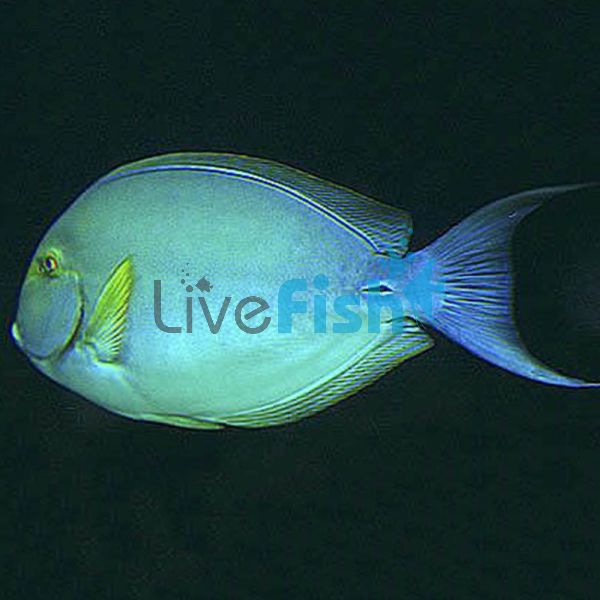Tang Yellowfin Surgeonfish MED
One of the largest types of surgeonfish which isn't normally found in captivity. This impressive specimen is also one of the few of its genus that is poisonous. Intimidating as it is large, the Yellowfin surgeonfish is a remarkable addition to the right aquarium.
This species can vary greatly in colouring. They can sometimes have a wide yellow stripe running down their eye along with blue stripes along the fin. Its body is normally a faint white colour fringed with deep purple. They have a small spine on either side which they use to defend themselves.
To date, no one has been successful when attempting to breed these fish in captivity. There have though been reports of spawnings in public aquariums. No differences between the sexes have been identified.
This high energy fish starts off as a small yellow juvenile but will quickly grow up to almost 28 inches with a personality as big to match.
These fish are found all over the world but seem to be more concentrated in Japan and Northern Australia. They have been spotted from the Gulf of California all the way over to East Africa. They have been found at depths down to 100 metres. Sometimes they like to school and are capable of surviving various zones including deepwater, sandy-bottomed lagoons and reef slopes.
Tank Recommendations for Yellowfin Surgeonfish
The smallest tank size recommended for housing these fish due to their huge size is at least 750 litres. The tank needs to also be 2.5 to 3 metres long to allow it plenty of space to swim around. They will need lots of rocks and/or coral hideaways in which they can wedge themselves into at night for sleeping. Surgeonfish love water movement because they need lots of oxygen so provide at least one area of the tank with strong water movement. Normal lighting conditions will suffice as long as some dimly lit areas are available. They will spend most of their time in the open water areas of the tank but will hide in crevices during the night.
Suitable Tank Buddies
Surgeonfish are semi-aggressive in nature but the Yellowfin does seem to get along with most other fish. They can be territorial with other members of the genus especially in they look similar.
Usually Compatible
This species will do well with dwarf and large types of Angelfish along with anglers Blennies and Boxfish. Clownfish, crustaceans and Damselfish would make perfect tank buddies too. Other species which would make excellent choices include Wels, Flefish and Goatfish. Gobies, Groupers and Hawkfish are other good options as well.
Sometime Compatible
Take caution when keeping these surgeonfish with species such as Triggerfish, Tangs and Rays. Cardinalfish, Butterflyfish and Batfish should also be watched carefully as well.
Rarely Compatible
Even though they are a big species they could still be possible seen as prey by certain species of Sharks so avoid keeping them together. Also due to their big and boisterous nature, smaller more docile species such as Pipefish and Seahorses could be too frightened to come out of hiding and feed.
Feeding Your Yellowfin Surgeonfish
This species is omnivorous and in the wild will feed upon the detritus hidden in the sand. In captivity, they will accept a variety of foods including flakes, pellets, algae and small crustaceans. They will also love frozen foods such as mysis and brine shrimp as well as marine formulas that contain spirulina. Feed them at least three times a day, but only enough for them to eat in one sitting. Some aquarium owners have had success with boiled vegetables such as broccoli and lettuce.
| Scientific Name | Acanthurus xanthopterus |
|---|---|
| Care Level | Hard |
| Common Names | The Yellowfin Surgeonfish is also known as the Yellowfin Tang, the Yellow-mask Surgeonfish and the Purple Surgeonfish |
| Diet | Omnivore |
| Fish Family | Acanthuridae |
| Lifespan (years) | 12 |
| Max. Length (cm) | 71 |
| Min. Tank Volume (l) | 750 |
| Origin | Indo-Pacific |
| Reef Safe | Yes |
| Sociability | Semi-aggressive |
| Venomous | Yes |
| Water Conditions | 24-28° C (76-82° F), dKH 8-12, pH 8.0-8.5, sg 1.020-1.025 |




